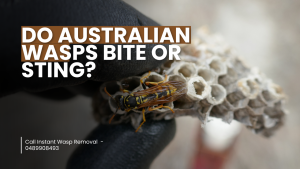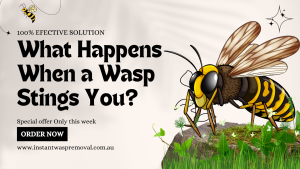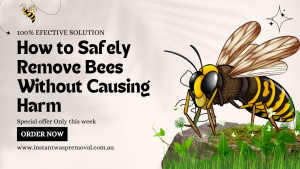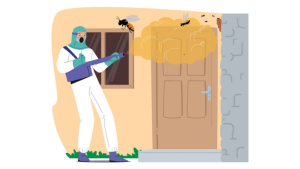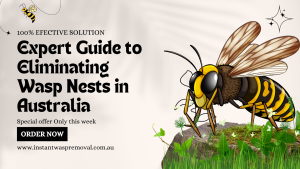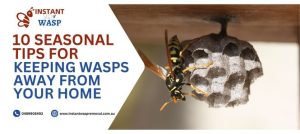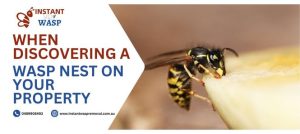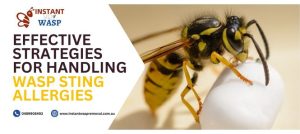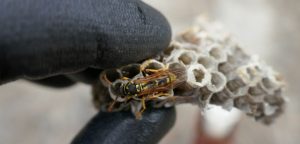Australian wasps are known for their distinctive buzzing presence in the warm months, and it’s their sting that often grabs attention. Unlike bees, which can only sting once, wasps can sting repeatedly, making them formidable. Wasp stingers contain venom, which they release into your system when they sting you. This can pose a risk, especially for allergy-prone individuals, leading to pain, swelling, and potentially severe allergic reactions. Hence, it’s crucial to safeguard your family from wasps and prevent them from stumbling upon their nests. Remember, wasps can become defensive and attack in swarms when threatened. However, they typically only attack when provoked. So, it’s essential to keep a safe distance and avoid their sharp sting. If you’re facing issues, consider seeking professional help like Wasp Removal Carrum Downs to ensure a safe environment.
Do Australian wasps bite?
Yes, wasps have mandibles, which they can use to inflict a painful bite. These mandibles are also used to chew and digest food. Normally, a wasp bite is not very painful and usually does not break skin. But when they feel threatened, wasps normally use their stinger to deliver a painful sting to keep their predators at bay. Remember, wasp bites and stings are painful. They are both dangerous for allergy-prone people who can suffer from exposure to the venom.
What are the most common Australian wasp species?
A variety of wasp species, some native and others introduced, inhabit Australia. Here are some common ones:
The European Wasp is an introduced species that is considered a pest in Australia. It’s known for its yellow and black-striped abdomen.
Paper Wasp: Australia is home to several species of paper wasps. They build distinctive paper-like nests attached to branches, eaves, or other structures. They are generally less aggressive compared to some other wasp species.
Mud Dauber Wasp: These wasps are known for constructing nests out of mud. They are solitary wasps and generally do not attack unless provoked.
Potter Wasps are named for their habit of building small, vase-shaped nests out of mud. They are solitary and typically not aggressive toward humans.
Parasitic Wasps: Australia is home to numerous species of parasitic wasps, which lay their eggs on or inside other insects. Despite their valuable role in controlling pest populations, their small size and inconspicuous behavior often go unnoticed by humans.
Australia is home to several species of yellowjacket wasps. They are social insects that build nests underground or in other protected locations.
These are just a few examples, and there are many more species of wasps found throughout Australia, each with its own unique characteristics and habits.
Ennumerate the Australian wasp species that resort to biting.
Given below are a few Australian wasp species known for resorting to biting:
Paper Wasps: Paper wasps are known to sting and bite if they feel threatened, especially when their nest is disturbed.
Yellowjackets: Yellowjackets are aggressive wasps that can deliver painful stings and also resort to biting if they perceive a threat.
European Wasps: An introduced species in Australia, European wasps are known for their aggressive behavior, including both stinging and biting.
Common Wasps: Similar to the European wasp, the common wasp is also known to bite in addition to stinging when provoked.
These are just a few examples, and there might be other species as well. It’s important to note that while most wasps will sting if they feel threatened, biting behavior can vary among species and individuals.
A few statistics on Australian wasps
According to an analysis of Australian bites and stings statistics, bees and wasps accounted for 33% of the total venomous stings and bites. Most of these stings occurred at home, in major cities, and in interregional areas. Wasps are very active during the months from April to October.
Female wasps inflict the majority of bites and stings. Female wasps are of two types: the queen wasp and the worker wasp. Worker wasps are sterile females that work very hard to build the hive and take care of the young. They have only one stinger, and after they deliver the sting, they die. They release pheromones when they die, alerting the rest of the hive to the threat to the nest.
How can various prevention methods help you avoid wasp bites
Preventing wasp bites and stings primarily involves minimizing your exposure to these insects and taking precautions when in areas where they are common. Here are some methods to help you avoid wasp bites and stings:
Avoidance: Be aware of your surroundings and try to avoid areas where wasps are likely to nest, such as near garbage bins, outdoor eating areas, and flowering plants. If you know you’re allergic to wasp stings, take extra precautions to stay away from areas where they might be present.
Cover up: When spending time outdoors, especially in areas where wasps are prevalent, wear long-sleeved shirts, long pants, and closed-toe shoes to minimize exposed skin.
Use insect repellent: Apply insect repellent containing picaridin to your exposed skin, following the product instructions carefully. This can help deter wasps from landing on you.
Avoid sweet scents: Strong perfumes, colognes, and brightly colored clothing may attract wasps.
Keep food and drinks covered: When eating or drinking outdoors, keep meals and beverages covered with lids or in sealed containers to prevent wasps from being attracted to them.
Maintain cleanliness: Keep outdoor eating areas clean and free of food debris, as this can attract wasps looking for a meal.
Be cautious around nests. If you spot a wasp nest, avoid disturbing it and keep your distance. Do not attempt to remove the nest yourself; instead, contact a professional pest control service to handle it safely.
Stay calm and still. If a wasp approaches you, try to remain calm and avoid swatting at it, as this can provoke it to sting. Instead, stay still or slowly move away from the area.
Protective clothing: If you need to work in an area where wasps are present, consider wearing protective clothing such as a beekeeping suit or thick gloves to reduce the risk of being stung.
Educate yourself: Learn to recognize different types of wasps and their behavior patterns, so you can take appropriate precautions when necessary.
By using these preventative techniques, you can lower your risk of wasp stings, as well as the likelihood of an allergic reaction or other problems from their bites.
Using professional services to eradicate wasps in your neighborhood
When faced with a wasp infestation in your neighborhood, it’s crucial to employ professional pest control services for efficient and safe eradication. Trained experts possess the necessary knowledge, tools, and protective gear to handle wasp nests effectively, minimizing risks to residents and pets. By entrusting the task to professionals, you ensure thorough removal of the threat, restoring peace and safety to your community swiftly and responsibly.
Conclusion
Protecting oneself from Australian wasps requires vigilance and caution. When outdoors, wearing long sleeves, pants, and closed-toe shoes can reduce the risk of stings. Avoiding brightly colored clothing and sweet-smelling perfumes or lotions can also deter these insects. Additionally, keeping food and drinks covered during outdoor activities can help prevent them from being drawn. If you encounter a wasp, remain calm and slowly move away without swatting or agitating it, as this may provoke an attack. Understanding their behavior and habitats can aid in avoiding potentially dangerous situations, ensuring a safer outdoor experience.


